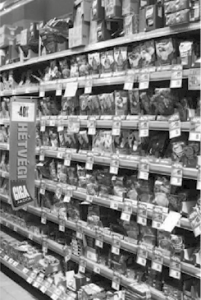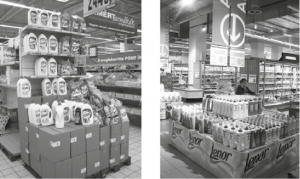Magazine: Comprehensive survey on shopping habits
In 2014 POPAI Hungary Association conducted a representative shopping habits survey, with the involvement of 23,000 shoppers in 6 hypermarkets. The study’s objective was to give relevant information on consumer decision making to companies in the FMCG sector. Three methods were used: 902 customers filled out questionnaires, the eye tracking technology of Tobii Technology was used with 224 shoppers and 21,772 customers were observed in various parts of the store. The typical Hungarian hypermarket customer has secondary school qualifications, lives in a 2-3 member household and has HUF 140,000-280,000 to spend a month.

They visit hypermarkets 3-4 times a week, where they plan to purchase 4-5 products per occasion. Finally they put 8-9 items in their basket, which cost about the same as the sum originally planned to be spent. They have a loyalty card which they use. Both primary and secondary product placements were examined in the study. Data showed that shoppers primarily take products from the main place where they are displayed. 11.1 percent of products ended up in the baskets from secondary placement – 65.8 percent of this proportion from a pallet or standing display. The best selling secondary placement items were fruit juice, soft drinks, laundry detergents, butters and margarines.

On average only every fourth secondary product placement is noticed by customers and they only spend 0.9 second looking at them! One of the survey’s most important findings was that the in-store location and the product type displayed are the most important factors in noticing items in secondary placement. Other factors don’t affect whether the product is noticed or how long it is being looked at. In the secondary placement category pallets displayed in the main aisle and gondola ends are the absolute winners, displaying promotional or seasonal products. The study also made it clear that in the case of both primary and secondary placement shoppers glance at the product first, followed by other goods or the price – communication materials receive little attention. //
Related news
Hungarian SMEs need more information on ESG requirements
A recent research by Billingo has found that 67% of…
Read more >Most online shoppers are fed up with unpredictable parcel delivery times
According to a recent Ipsos survey commissioned by DODO, it…
Read more >Consumers have reached the limits of their capacity
In August 2024 RRD came out with its Awareness-to-Action Study…
Read more >Related news
The majority of Hungarians spend less than 50 thousand forints on Christmas gifts, sustainability is an important aspect, but not the primary one
Gift-giving is an essential holiday tradition, but what really matters…
Read more >Rossmann ended the year with charity
This year, Rossmann Hungary also provided support to many needy…
Read more >








